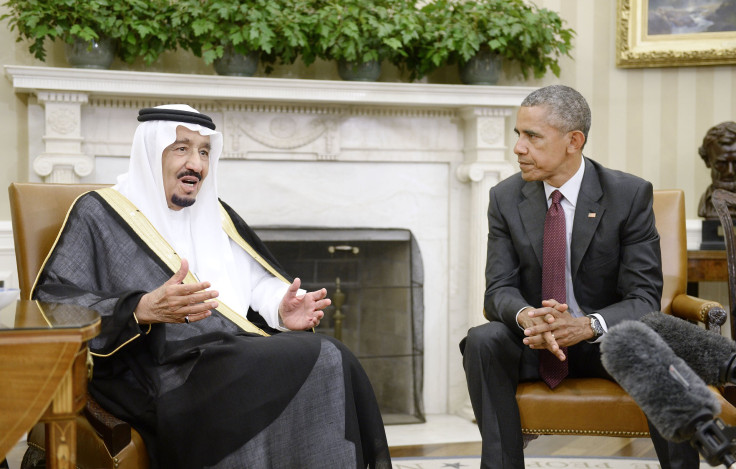Saudi Arms Deal Backed By US Senators Who Got Cash From Weapons Contractor That Will Benefit

The U.S. Senate on Wednesday blocked a bipartisan initiative to suspend a $1.15 billion arms deal to Saudi Arabia, clearing the way for a massive resupply of the Kingdom’s military as it continues its incursions into neighboring Yemen. The victory over lawmakers who were trying to stop the deal will benefit General Dynamics — a defense contractor whose employees and corporate executives have spent millions of dollars on lobbying and campaign contributions in the lead-up to the vote.
Last month, the Obama administration greenlit the sale, which includes 130 Abrams battle tanks and 20 armored recovery vehicles. The arms will help replenish those lost or destroyed in the war in Yemen, where the Saudi military is trying to reinstall the country’s ousted president, who is a close Saudi ally. A bipartisan coalition of senators, including Kentucky Republican Rand Paul, Utah Republican Mike Lee, Connecticut Democrat Chris Murphy and Minnesota Democrat Al Franken, moved to block the transaction. They cited concerns about Saudi Arabia’s human rights record, and questioned the wisdom of U.S.-supplied arms race in the region.
In a 71-27 procedural vote Wednesday afternoon, the Senate decided to table the senators’ objections to the deal — effectively destroying any chance at blocking the arms sale.
The approval of the arms deal comes at a pivotal time for General Dynamics, which manufactures the armaments at issue. Last quarter, its combat division experienced a 7 percent dip in sales, and the company has been slashing jobs at its Ohio tank manufacturing center.
General Dynamics has been spending big on politics in recent years. Since 2008, the company has pumped over $1 million dollars into both Democratic and Republican senatorial campaigns. According to data from the Center for Responsive Politics, the company in the 2016 election cycle has so far donated over $300,000 to 49 senatorial campaigns on both sides of the aisle: $134,835 to Democrats and $171,555 to Republicans, with an average contribution of around $6,400. General Dynamics’ political action committee has also donated $165,000 to the political parties’ congressional election committees: $90,000 to the GOP and $75,000 to the Democrats.
The top three Senate recipients of General Dynamics donations in the 2016 election cycle — Georgia Republican Johnny Isakson, Michigan Democrat Gary Peters, and Rhode Island Democrat Jack Reed — all voted to push forward the deal. Some senators who have received sustained contributions from General Dynamics over the years, however, voted against the company's interests, including Sen. Murphy and Vermont Independent Bernie Sanders.
According to federal records reviewed by International Business Times, the company spent nearly $7 million on Washington lobbying in just the first half of 2016 — up 4 percent from the same period in 2015. In the second quarter of 2016, the firm employed 27 former government officials as Washington lobbyists.
Much of the Senate floor debate revolved around whether Saudi Arabia is a reliable U.S. ally, deserving of advanced U.S. weaponry. South Carolina Sen. Lindsey Graham, a strong supporter of the deal, said Saudi was not a “perfect” partner, but argued that the weapons were needed to counter Iranian influence in the region. Tennessee Republican Bob Corker warned his colleagues that if the deal didn’t go through, Saudi Arabia might go “someplace else” to purchase its weapons.
On the other side of the debate, Sen. Paul said that lawmakers should resist the temptation to “give the arms industry what they want.” Saudi Arabia, he said, already has enough weapons “to blow up the Middle East 10 times over.” Paul was joined by Sen. Murphy, who objected to the weapons deal because of Saudi Arabia’s poor human rights record and its indiscriminate bombardment of Yemen.
Saudi Arabia first began bombing in Yemen in March 2015 to back its favored faction in an ongoing Yemeni civil war. From the very beginning, Saudi relied upon U.S.-supplied equipment and ammunition from contractors like General Dynamics, as well as U.S. intelligence and logistical support from the Pentagon. Since the bombing began, one out of three Saudi strikes has hit a civilian site, and Saudi warplanes have bombed four separate Doctors Without Borders buildings, forcing the aid group to suspend operations in large swaths of the country. Human rights groups — including Amnesty International, and Human Rights Watch — have suggested Saudi Arabia may be committing war crimes.
The sustained bombardment of Yemen is made possible by an unprecedented surge in weapon sales from U.S. suppliers.
Since 2009, the Obama administration has signed 42 separate arms deals to Saudi Arabia, worth nearly $115 billion — more than any administration before it. The uptick in sales has been a boon to a number of well-connected defense contractors including Boeing, whose F-15S combat aircraft is the backbone of the Saudi Air Force; Lockheed Martin, which sells Saudi Arabia its C-130J transport plane; and General Dynamics, which supplies the M1A1 tank.
A parallel effort to block the pending General Dynamics sale is underway in the House of Representatives. General Dynamics spends spent much more on Congressional races than it does on the Senate — ahead of the 2016 election, the company has already dumped $913,305 into house races.
© Copyright IBTimes 2025. All rights reserved.




















